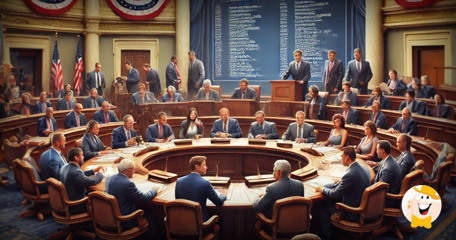Gambling
NCLGS Makes Model For Legislation For US Online Gambling

As the US online gambling landscape evolves, the National Council of Legislators from Gaming States (NCLGS) is stepping up to provide a much-needed framework for legal online gambling. In a bold move to streamline and standardize legislation, the NCLGS is developing a model bill that aims to guide lawmakers across the country in implementing online gambling laws starting in 2025. This initiative is set to transform how states approach online gaming, providing a structured blueprint that addresses key regulatory concerns.
Crafting the Model Legislation
At a recent NCLGS meeting in Pittsburgh, former Florida State Senator Steve Geller unveiled the preliminary details of the model legislation. The proposed framework is designed to address several critical areas, ensuring a comprehensive and balanced approach to online gambling. The draft legislation focuses on seven primary components:
Revenue Generation: Establishing a clear strategy for managing and distributing online gambling revenue.
Responsible Gaming: Implementing safeguards to promote responsible gambling and protect consumers.
The Cannibalisation Question: Addressing concerns about online gambling negatively impacting land-based casinos.
Advertising Guidelines: Setting standards for ethical and responsible advertising practices.
Licensing: Defining licensing requirements to ensure operators meet high standards of security and integrity.
Age Limits: Enforcing strict age restrictions to prevent underage gambling.
Data Sharing: Facilitating effective data sharing between operators and regulators for enhanced oversight.
The draft proposes a tax rate of 15% to 25%, which is in line with the average tax rates in the seven US states where online gambling is currently legal. This tax structure aims to balance state revenue needs with maintaining a competitive environment for operators.
The NCLGS is working diligently to finalize the model legislation. By August 1, 2024, a draft of the bill will be shared with NCLGS members for initial review. Following this, a 30-day public comment period will allow stakeholders to provide feedback. The final version of the model bill is expected to be presented at the NCLGS meeting in New Orleans, scheduled for December 12-15, 2024.
This process is designed to ensure that the model legislation is both robust and adaptable, providing a solid foundation for states to build upon as they consider their own online gambling laws.
Insights from the Field
The need for a model bill is underscored by the current state of online gambling legislation in the US. Since the Supreme Court’s 2018 decision to lift the PASPA ban, nearly 40 states have legalized sports betting. However, only seven states—Connecticut, Delaware, Michigan, New Jersey, Pennsylvania, Rhode Island, and West Virginia—have fully embraced online gambling.
Maryland State Senator Ronald Watson, who led efforts to legalize online gambling in his state, highlighted the importance of education and public engagement in the legislative process. Watson stressed that legalizing online gambling requires a coordinated effort, likening it to a campaign where building a strong team and public support is crucial.
One of the driving forces behind the push for online gambling legislation is its potential for revenue generation. Online gambling has proven to be a significantly more lucrative source of tax revenue compared to sports betting. In fact, estimates suggest that online gambling revenue can be three to five times greater than that from sports betting. As states face budgetary pressures and dwindling COVID-19 relief funds, the financial benefits of online gambling become increasingly appealing.
Former New Jersey Division of Gaming Enforcement Director David Rebuck emphasized the importance of uniform technology standards and revenue certification in the regulatory framework. Ensuring that technology companies adhere to the same standards as gambling operators is crucial for maintaining the integrity of the industry.
Additionally, anti-money laundering measures were highlighted as a critical component of the regulatory framework. Howard Glaser from Light and Wonder underscored the need for robust AML practices to combat illegal activities and ensure the legitimacy of online gambling operations.
Addressing Cannibalisation Concerns
A common argument against online gambling is the potential for cannibalization of land-based casinos. However, evidence from New Jersey suggests that this concern is largely unfounded. Studies indicate that online gambling does not significantly detract from the revenue of brick-and-mortar casinos. Instead, offering both online and retail options can enhance overall revenue for operators.
Source:
”US legislators crafting model legislation to create pathway to legal igaming”, igamingbusiness.com, July 22, 2024.










